【人教版精品】高一英语必修四导学案全集
人教版高一英语Book 4 unit4 using language 导学案
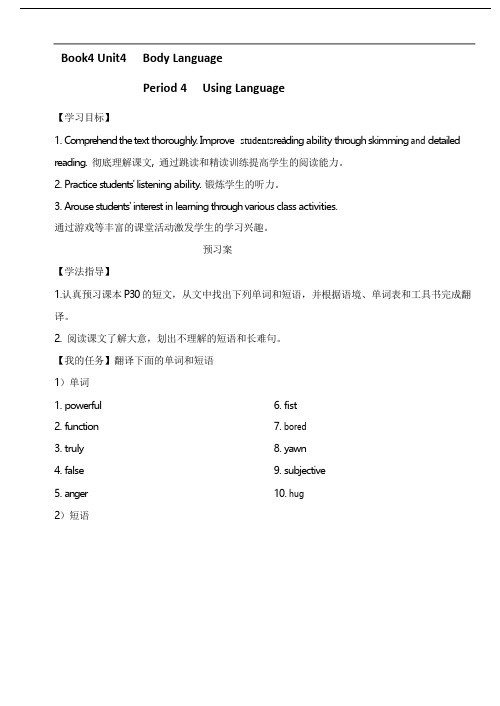
’Book4 Unit4Body LanguagePeriod 4Using Language【学习目标】1. Compr ehend the text thoroughly . Improve students reading ability thr ough skimming and detailedreading. 彻底理解课文, 通过跳读和精读训练提高学生的阅读能力。
2. Practice students' listening ability. 锻炼学生的听力。
3. Arouse students' interest in learning thr oug h various class activities.通过游戏等丰富的课堂活动激发学生的学习兴趣。
预习案【学法指导】1.认真预习课本 P30 的短文,从文中找出下列单词和短语,并根据语境、单词表和工具书完成翻译。
2. 阅读课文了解大意,划出不理解的短语和长难句。
【我的任务】翻译下面的单词和短语1)单词1. powerful2. function3. truly4. false6. fist7. bored8. yawn9. subjective5. anger10. hug2)短语1.means of communication2.even if3.facial expression4..at ease5.丢脸6.背对7.在大部分情况下8.总体上,一般而言Ⅰ.重点单词重点单词•1.____________n.作用;功能;职能vi.起作用;运转→____________adj.功能的•2.____________n.安逸;舒适vt.减轻(痛苦、忧虑)→____________adj.•3.____________n.怒气;怒火→____________adj.生气的•4.____________adj.主观的→____________adv.主观地→____________adj.客观的客观的•5.____________vi.&vt.拥抱•6.____________n..等级;军衔•7.____________vi.皱眉•8._____________vt.读错;误解→______读懂;了解•9._____________adj.错误的;假的•10.____________n.拳头•11.____________vi.打哈欠•12._____________adj.恭敬的→____________v.尊敬→____________adv.尊敬地•13.______adv.真实地→______adj.真实的→_______n.真实;真实;•Ⅱ.重点短语重点短语•1.________________口头语言•2.________________全世界•3.________________面部表情•3.________________舒适,快活,自由自在•4.________________丢脸•5.________________背对-------;背弃•6.________________误会,误解•7.________________不看;把目光移开探究案【学法指导】仔细阅读P30文章,小组合作探究完成相关题目。
【人教版精品】高一英语必修四导学案全集精编版
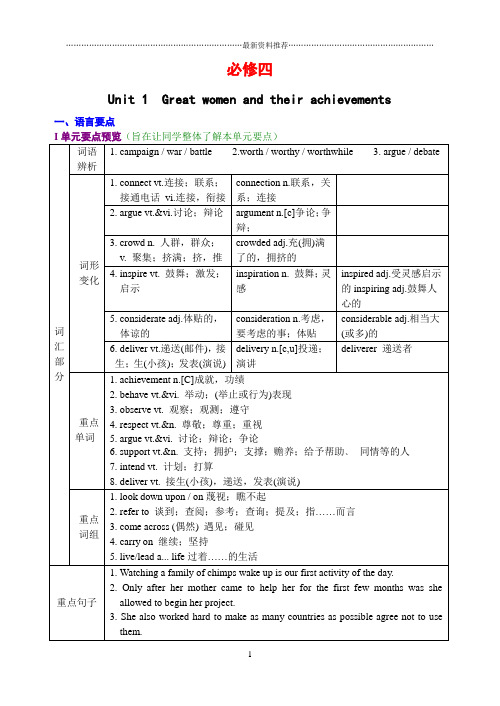
必修四Unit 1 Great women and their achievements 一、语言要点IV 重点词汇(旨在提供综合运用所需材料)1. behave vt.&vi. 举动;(举止或行为)表现behavio(u)r n. 行为;举止;习惯[典例]1). Behave yourself; don’ t make a fool of yourself. 注意你的举止, 别闹出笑话来。
2). How is your new car behaving? 你的新车性能如何?[重点用法]behave oneself 使某人自己举止规矩behaviour towards/to... 对……的态度/行为[练习] 根据句子的要求在括号里填入适当的词或翻译。
1). It’ s hard to train children to _______ _______ (举止得体) at the table.2). She is always _______ _______ (举止得体) at school.3). Their _______ (behave) _______ (介词) me shows that they do not like me.Keys: 1). behave well 2). well behaved 3). behaviour towards2. achievement n.[c]成就,功绩achieve vt. 取得,完成[典例]1). He received the Nobel Prize for his scientific achievements. 他因科学上取得的成就而获得诺贝尔奖。
2). Flying across the Atlantic for the first time was a great achievement. 首次飞越大西洋是一个伟大的功绩。
[重点用法]achieve an aim / goal达到目标achieve success 获得成功[练习] 根据句子的意思在括号里填入适当的词。
#高中英语人教版必修4精品导学案(120页)
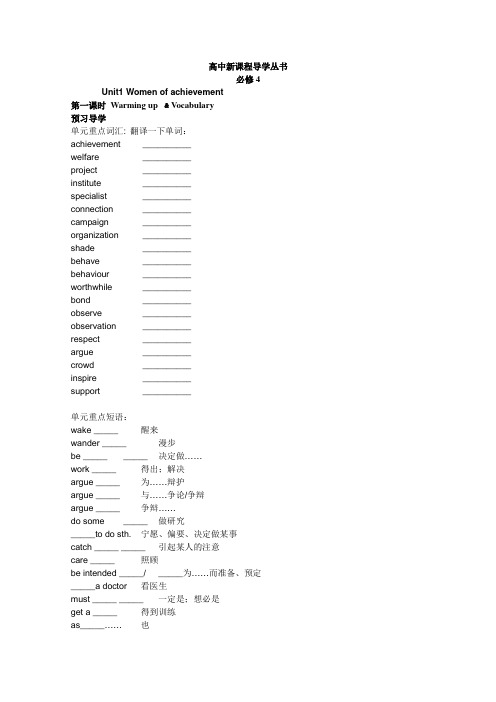
高中新课程导学丛书必修4Unit1 Women of achievement第一课时Warming up ﹠Vocabulary预习导学单元重点词汇: 翻译一下单词:achievement __________welfare __________project __________institute __________specialist __________connection __________campaign __________organization __________shade __________behave __________behaviour __________worthwhile __________bond __________observe __________observation __________respect __________argue __________crowd __________inspire __________support __________单元重点短语:wake _____ 醒来wander _____ 漫步be _____ _____ 决定做……work _____ 得出;解决argue _____ 为……辩护argue _____ 与……争论/争辩argue _____ 争辩……do some _____ 做研究_____to do sth. 宁愿、偏要、决定做某事catch _____ _____ 引起某人的注意care _____ 照顾be intended _____/ _____为……而准备、预定_____a doctor 看医生must _____ _____ 一定是;想必是get a _____ 得到训练as_____……也second _____ 次于get sb. _____ 使某人进入/陷入story _____ 一个故事接着一个_____a baby 给……接生_____the time 这时候carry_____ 继续be _____about 对……关心put…_____ _____ 处死devote……_____ 把……专注于……rather _____ 不是……而是……mean _____ 意味着mean _____ 打算做……settle _____ 安顿下来apply _____ 使用到……be _____to 已经做好准备去做……prepare_____ 准备要做……实战演练一、用worth/worthy/worthwhile 填空1. It’s well ____ making the effort to learn how to drive.2. We had a long wait, but it was _____ because we got the train tickets.3. Their success is _________ of the highest praise.4. It is not _____ my time.5. It is ________ to read the book.6. The book is _________ reading.7.This book is _________ to be read.二、完成句子:1. She ___________________(昨天表现出了巨大的勇气)。
人教版高一英语Book 4 unit4 using language 导学案
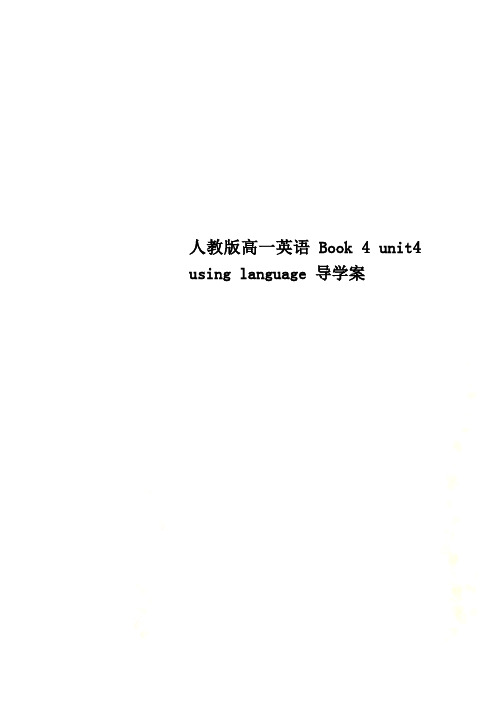
人教版高一英语Book 4 unit4 using language 导学案Book4 Unit4 Body LanguagePeriod 4 Using Language【学习目标】1. Comprehend the text thoroughly. Improve students’ reading ability through skimming and detailed reading. 彻底理解课文, 通过跳读和精读训练提高学生的阅读能力。
2. Practice students' listening ability. 锻炼学生的听力。
3. Arouse students' interest in learning through various class activities.通过游戏等丰富的课堂活动激发学生的学习兴趣。
预习案【学法指导】1.认真预习课本P30的短文,从文中找出下列单词和短语,并根据语境、单词表和工具书完成翻译。
2. 阅读课文了解大意,划出不理解的短语和长难句。
【我的任务】翻译下面的单词和短语1)单词1.powerful2.function3.truly4.false5.anger6.fist7.bored8.yawn9.subjective10.hug2)短语• 11. ____________vi. 打哈欠• 12. _____________adj. 恭敬的→____________v. 尊敬→____________adv.尊敬地• 13. ______adv. 真实地→______adj. 真实的→_______n. 真实; 真实;• Ⅱ.重点短语 重点短语• 1 .________________ 口头语言• 2 .________________ 全世界• 3. ________________ 面部表情• 3 .________________ 舒适,快活,自由自在• 4 .________________ 丢脸• 5 .________________ 背对-------;背弃 • 6 .________________ 误会,误解• 7 .________________ 不看;把目光移开探究案【学法指导】仔细阅读P30文章,小组合作探究完成相关题目。
人教新课标英语必修4全册优秀导学案(60页)
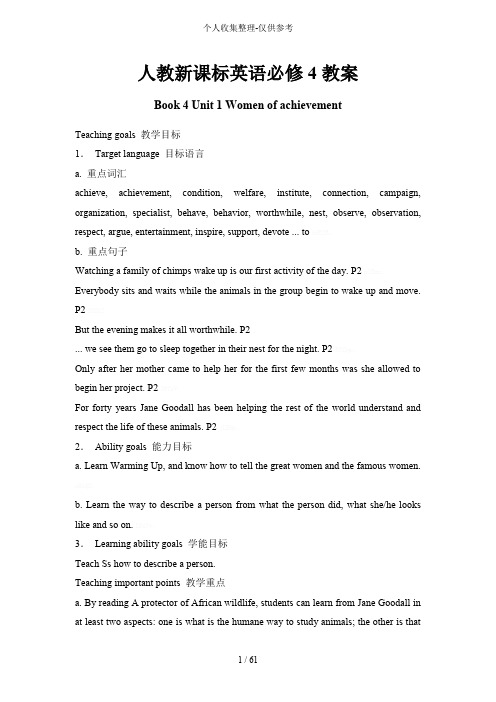
人教新课标英语必修4教案Book 4 Unit 1 Women of achievementTeaching goals 教学目标1.Target language 目标语言a. 重点词汇achieve, achievement, condition, welfare, institute, connection, campaign, organization, specialist, behave, behavior, worthwhile, nest, observe, observation, respect, argue, entertainment, inspire, support, devote ... to b5E2R。
b. 重点句子Watching a family of chimps wake up is our first activity of the day. P2 p1Ean。
Everybody sits and waits while the animals in the group begin to wake up and move. P2 DXDiT。
But the evening makes it all worthwhile. P2... we see them go to sleep together in their nest for the night. P2 RTCrp。
Only after her mother came to help her for the first few months was she allowed to begin her project. P2 5PCzV。
For forty years Jane Goodall has been helping the rest of the world understand and respect the life of these animals. P2 jLBHr。
【人教版精品】高一英语必修四导学案全集
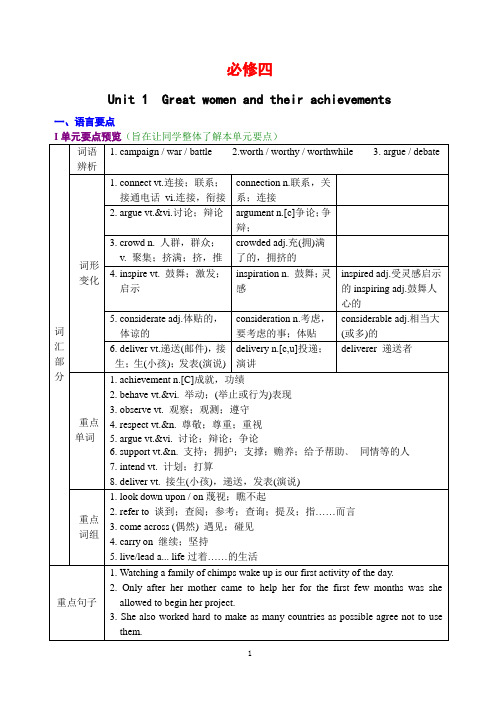
必修四Unit 1 Great women and their achievements 一、语言要点IV 重点词汇(旨在提供综合运用所需材料)1. behave vt.&vi. 举动;(举止或行为)表现behavio(u)r n. 行为;举止;习惯[典例]1). Behave yourself; don’ t make a fool of yourself. 注意你的举止, 别闹出笑话来。
2). How is your new car behaving? 你的新车性能如何?[重点用法]behave oneself 使某人自己举止规矩behaviour towards/to... 对……的态度/行为[练习] 根据句子的要求在括号里填入适当的词或翻译。
1). It’ s hard to train children to _______ _______ (举止得体) at the table.2). She is always _______ _______ (举止得体) at school.3). Their _______ (behave) _______ (介词) me shows that they do not like me.Keys: 1). behave well 2). well behaved 3). behaviour towards2. achievement n.[c]成就,功绩achieve vt. 取得,完成[典例]1). He received the Nobel Prize for his scientific achievements. 他因科学上取得的成就而获得诺贝尔奖。
2). Flying across the Atlantic for the first time was a great achievement. 首次飞越大西洋是一个伟大的功绩。
[重点用法]achieve an aim / goal达到目标achieve success 获得成功[练习] 根据句子的意思在括号里填入适当的词。
高中英语人教版必修4精品导学案(120页)
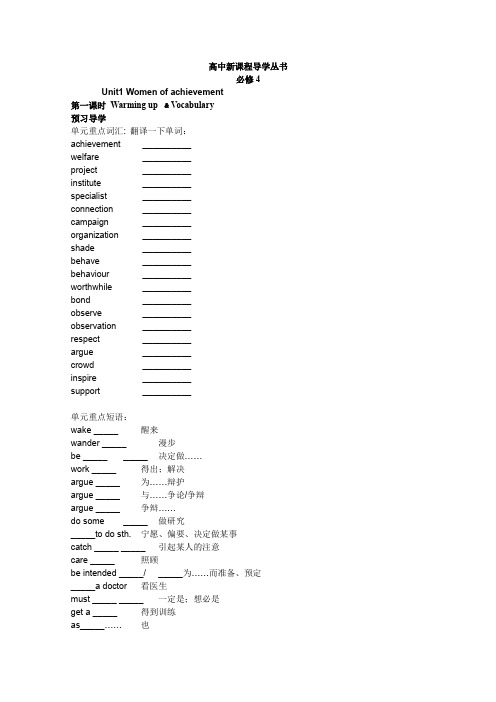
高中新课程导学丛书必修4Unit1 Women of achievement第一课时Warming up ﹠Vocabulary预习导学单元重点词汇: 翻译一下单词:achievement __________welfare __________project __________institute __________specialist __________connection __________campaign __________organization __________shade __________behave __________behaviour __________worthwhile __________bond __________observe __________observation __________respect __________argue __________crowd __________inspire __________support __________单元重点短语:wake _____ 醒来wander _____ 漫步be _____ _____ 决定做……work _____ 得出;解决argue _____ 为……辩护argue _____ 与……争论/争辩argue _____ 争辩……do some _____ 做研究_____to do sth. 宁愿、偏要、决定做某事catch _____ _____ 引起某人的注意care _____ 照顾be intended _____/ _____为……而准备、预定_____a doctor 看医生must _____ _____ 一定是;想必是get a _____ 得到训练as_____……也second _____ 次于get sb. _____ 使某人进入/陷入story _____ 一个故事接着一个_____a baby 给……接生_____the time 这时候carry_____ 继续be _____about 对……关心put…_____ _____ 处死devote……_____ 把……专注于……rather _____ 不是……而是……mean _____ 意味着mean _____ 打算做……settle _____ 安顿下来apply _____ 应用到……be _____to 已经做好准备去做……prepare_____ 准备要做……实战演练一、用worth/worthy/worthwhile 填空1. It’s well ____ making the effort to learn how to drive.2. We had a long wait, but it was _____ because we got the train tickets.3. Their success is _________ of the highest praise.4. It is not _____ my time.5. It is ________ to read the book.6. The book is _________ reading.7.This book is _________ to be read.二、完成句子:1. She ___________________(昨天表现出了巨大的勇气)。
人教版必修高一英语下学期Book4Unit4语法导学案全面版

人教版必修高一英语放学期Book4 Unit4语法导教案课标解读:本单元的语法项目是动词的-ing 形式做状语和定语。
教师应该启迪学生思虑,经过示例指引学生总结出动词的-ing 形式在什么状况下作状语或作定语,而后进一步理解其用法,直至比较娴熟的掌握与运用。
Teaching aims(教课目标)Knowledge aims:Get students to know the use of the –ing formas the attribute and the adverbial.Ability aims:Enable students to learn the use of the –ing formas the attribute and the adverbial accordingto the context.Emotional aim:1.Get students to become interested in grammar learning.2.Develop students ’ sense of group cooperation.Teaching emphasis(教课要点)Get students to learn and master the use of the –ing form as the attribute and the adverbial. Teachingdifficulties (教课难点)Enable students to learn how to use the rules ofthe –ing formas the attribute and the adverbial correctly.Teaching &learning procedures (教课与学习过程)【巧设导语激发兴趣】(5 分钟)Step1. Preparing lessons &self-study and exploring the problemsAsk the Ss to report the answers and read the passage quickly to point out the sentences including the –ing form in the text.【整体感知情形创建】Step2.Finishing plan & asking questionsReport the answers to the class and teacher.Point out the sentences including the–ing form in the text.Step3.Researching cooperatively& answering questionsAnd ask the Ss what the rules of the –ing form in the text are.Task1. turn back to Page 26 to read through the passage Communication:No Problem? pick out the sentences using the-ing forms as the attribute and theadverbial., and then underline the–ing form in each sentence and translate the whole sentence into Chinese.1)Yesterday, another student and I , representing our university’s studentassociation, went to the CapitalInternationalAirport to meet this year’s international students. (attribute)2)After half an hour of waiting for their flight to arrive, I saw several youngpeople enter the waiting area looking around curiously. (attribute)(adverbial)3)I stood for a minute watching them and then went to greet them.(adverbial)4)She stepped back appearing surprised and put up her hands, as if in defence.(adverbial)5)Then Akira Nagata from Japan came in smiling, together with George Cook fromCanada.(adverbial)6)Just at that moment,hwever, Akira bowed so his nose touched George ’s moving hand. (attribute)7)When Darlene Coulon from France came dashing through the door, she recognized Tony Garacia’s smiling face. (adverbial)8)In the same way that people communicate with spoken language , they also express their feelings using unspoken ”language”through physical distance, actions or posture.(adverbial)【提出问题合作研究】( 15 分钟)Step4.Summing &chewing, summarizing knowledgeTask 2.Grammar learning一、作定语。
人教版必修高一英语下学期Book4Unit4词汇导学案全面版

人教版必修高一英语放学期Book4 Unit4 词汇导教案课标解读:在学本元,通学生做“ 表演” 的游来掌握本元要点和短。
力争学生掌握哪些四会和要点短。
Teaching aims(教课目标)Knowledge aims:1. Get students to learn and grasp the important useful new words and expressions in this part: statement , great, represent, association, dormitory, canteen, flight, curious, curiously, Colombia, approach, cheek, defend, major, misunderstand, misunderstanding, Jordan, dash, adult, spoken, unspoken, Spain, Italy, likely, crossroads, facial, function, ease, truly, false, anger, fir\st, yawn, subjective, hug, rank, cassette. defend against, be likely to, in general, at ease, lose face, turn one’s back to2. Let students learn the following important useful sentence patterns:1)⋯ I saw several young people enter the waiting area looking around curiously. (the-ing form as the attributive and adverbial)2)The first person to arrive was Tony Garcia from Colombia,closely followed by Julia Smith from Britain(the past participle as adverbial)3)She stepped back appearing surprised and put up her hands , as if in defence (as if⋯)4)Not all cultures greet each other the same way, nor are they comfortable in the same way with touching or distance between people.(not ⋯ nor⋯ )5) ⋯.people from places like Spain ,Italy or South American countries approach others closelyand are more likely to touch them.(be likely to do ⋯ )6)⋯ studying international customs can certainly help avoid difficulties in today’s world of cultural crossroads!(the-ing form as the subject; help do ⋯ )Ability aims:1.Get students to use some useful new words and expressions correctly.2.Enable students to make sentences after the useful sentence patterns.Emotional aims:1.Stimulate students’ interest in learning English.2.Develop students’ spirit of cooperation and teamwork.Teaching emphasis(教课要点)Enable students to grasp the usages of such important new words and expressions Teachingdifficulties(教课点)1.Let students learn the usage of the expression.2.Enable students to learn waiting area“ looking around curiously f ” .3.Get students to understand some difficult and long sentences.Teaching &learning procedures (教课与学程)【巧激趣】(5 分)Step1. Preparing lessons &self-study and exploring the problemsFinish the tasks in the first period in time.Step2.Finishing plan & asking questionsReport the answers to the class and the teacher.Listen to the tape of the text and underline the new words in the text;Learn the new words and phrases after the teacher . Ask for help if necessary.【整体感知情形创建】Step3.Researching cooperatively& answering questions1.Yesterday,another student and I, representing our university , s student association, went to the Capital International Airport to meet this year ,s international students. (P26)昨天,我和另一个同学代表我大学的学生会去国都国机迎接今年的国学生。
- 1、下载文档前请自行甄别文档内容的完整性,平台不提供额外的编辑、内容补充、找答案等附加服务。
- 2、"仅部分预览"的文档,不可在线预览部分如存在完整性等问题,可反馈申请退款(可完整预览的文档不适用该条件!)。
- 3、如文档侵犯您的权益,请联系客服反馈,我们会尽快为您处理(人工客服工作时间:9:00-18:30)。
必修四Unit 1 Great women and their achievements 一、语言要点IV 重点词汇(旨在提供综合运用所需材料)1. behave vt.&vi. 举动;(举止或行为)表现behavio(u)r n. 行为;举止;习惯[典例]1). Behave yourself; don’ t make a fool of yourself. 注意你的举止, 别闹出笑话来。
2). How is your new car behaving? 你的新车性能如何?[重点用法]behave oneself 使某人自己举止规矩behaviour towards/to... 对……的态度/行为[练习] 根据句子的要求在括号里填入适当的词或翻译。
1). It’ s hard to train children to _______ _______ (举止得体) at the table.2). She is always _______ _______ (举止得体) at school.3). Their _______ (behave) _______ (介词) me shows that they do not like me.Keys: 1). behave well 2). well behaved 3). behaviour towards2. achievement n.[c]成就,功绩achieve vt. 取得,完成[典例]1). He received the Nobel Prize for his scientific achievements. 他因科学上取得的成就而获得诺贝尔奖。
2). Flying across the Atlantic for the first time was a great achievement. 首次飞越大西洋是一个伟大的功绩。
[重点用法]achieve an aim / goal达到目标achieve success 获得成功[练习] 根据句子的意思在括号里填入适当的词。
1). Without the support of the people we can _______ _______.2). I have achieved only half of _______ I hope to do.3). Congratulations to you (介词) _______ such a complete victory.Keys: 1). achieve nothing 2). what 3). on; achieving3. observe vt. 观察;观测;遵守observation n.[u] 观察;观测;监视[典例]1). The police observed the man entering/enter the bank. 警方监视着那男子进入银行的情况。
2). The woman was observed to follow him closely. 有人看到那女子紧跟着他。
[重点用法]observe sb. do sth. 观察某人做某事(已做完) observe sb. doing sth. 观察某人正在做某事under observation 被监视[练习] 用括号内所提供词的适当形式填空或翻译。
1). They were observed ______ (enter) the bank then.2). Keynes _______ _______ (观察到) humans fall into two classes.Keys: 1). entering 2). observed that4. respect vt.&n. 尊敬;尊重;重视[典例]1). If you don’ t respect yourself, how can you expect others to respect you? 自己不自重, 又怎能受到别人尊重呢?2). I have the greatest respect for you. 我非常尊敬您。
[重点用法]respect sb. for sth. 因某事而尊敬某人have / show respect for sb./sth. 尊敬某人/事gain/get/earn/win the respect of sb. 赢得某人的尊敬out of respect 出于尊敬[练习] 根据句子的要求在括号里填入适当的词或翻译。
1). The new officer soon ________ (赢得) the respect of his men.2). I ________ you ________ (因某事而尊敬) your honesty.3). I have great respect _______ (介词) his ideas, although I don’ t agree with them.Keys: 1). won/earned 2). respect; for 3). for[典例]1). Don’ t argue with your mother. 不要和母亲争辩。
2). I argued that we needed a larger office. 我据理力争我们需要大些的办公室。
[重点用法]argue for (sb./sth.)为(某人/某事)而辩护argue against (sb./sth.) 反对某人/某事)而辩护argue with sb. ( about/over sth.) 与某人(为某事)而争吵argue that... 主张……argue sb. into/out of doing sth. 通过争论使某人做/不做某事have an argument about/over sth. 辩论某事[练习] 根据句子的要求在括号里填入适当的介词或翻译。
1). We ______ ______ ______ ______ (说服她加入) us.2). We argued _______ the waiter _______ the price ______ the meal.Keys: 1). argued her into joining 2). with; about; of6. support vt.&n. 支持;拥护;支撑;赡养;给予帮助﹑同情等的人[典例]1). Is this bridge strong enough to support heavy lorries? 这座桥禁得住重型卡车通行吗?2). He was weak with hunger, so I had to support him. 他饿得没有力气, 我得搀着他。
[重点用法]support sb./ a family 支持某人/ 赡养家庭support sb. in (doing) sth. 在(做)某事方面支持某人support sb. by (doing) sth. 通过做某事支持某人in support of sb/sth 支持或支援某人/事物support oneself 自力更生give support to sb. 支持、支援某人[练习] 根据句子的要求在括号里填入适当的词或翻译。
1). Will you support me _______ (介词) my campaign for election?2). Jim was a great support _______ (介词) them when their father died.3). 我求学期间由父母供养。
___________________________________________________________________________ Keys: 1). in 2). to 3). I was supported by my parents when I was studying.7. intend vt. 计划;打算intention n. 意图,意向,目的[典例]1). I hear they intend to marry/intend marrying. 听说他们要结婚了。
2). I intend you to take over. 我打算让你来接管。
[重点用法]intend to do/doing sth. = mean to do sth. 打算做某sth. be intended for (某物)是为而准备的intend sb. to do sth. 打算让某人做某事intend sth. as/to be 打算让某物intend that... 打算……[练习] 根据句子的要求在括号里填入适当的词或翻译。
1). This book is ______ ______ ______ (是为初学者写的).2). Was that remark intended _______ (介词) a joke?3). I didn’ t intend her ______ (see) the painting until it was finished.Keys: 1). intended for 2). as 3). to see8. deliver vt.接生(小孩),递送,发表(演说) delivery n. 投递deliverer 递送者,交货人[典例]1). The baby was delivered in a clinic. 孩子是在一个医疗站接生的。
2). Comrade Yang delivered the opening speech. 杨同志致开幕词。
[重点用法]deliver a baby 接生小孩;生小孩delivere sth. to ...... 把某物送到……express delivery快递on delivery 送达时,货到时[练习] 根据句子的要求在括号里填入适当的词。
1). Some new books have ______ (deliver) ______ (介词) the schoo1.2). The actor _______ his speech _______ (介词) a soft voice.Keys: 1). been delivered; to 2). delivered/gave; inV 重点词组(旨在提供综合运用所需材料)1. look down upon/on蔑视;瞧不起[典例]1). She looks down on people who've never been to university. 她瞧不起没上过大学的人。
